北师大版(2019)必修 第三册 Unit 9 Learning Grammar课件(共71张PPT)
文档属性
| 名称 | 北师大版(2019)必修 第三册 Unit 9 Learning Grammar课件(共71张PPT) | 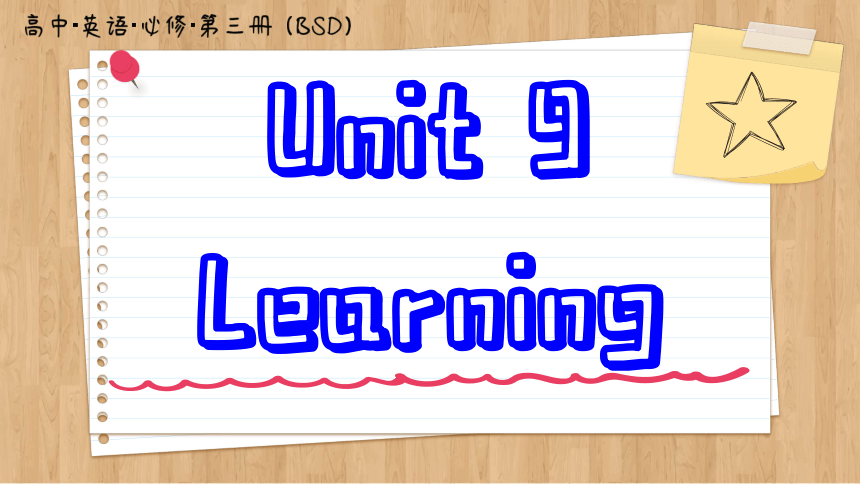 | |
| 格式 | pptx | ||
| 文件大小 | 65.6MB | ||
| 资源类型 | 教案 | ||
| 版本资源 | 北师大版(2019) | ||
| 科目 | 英语 | ||
| 更新时间 | 2024-04-17 16:06:12 | ||
图片预览

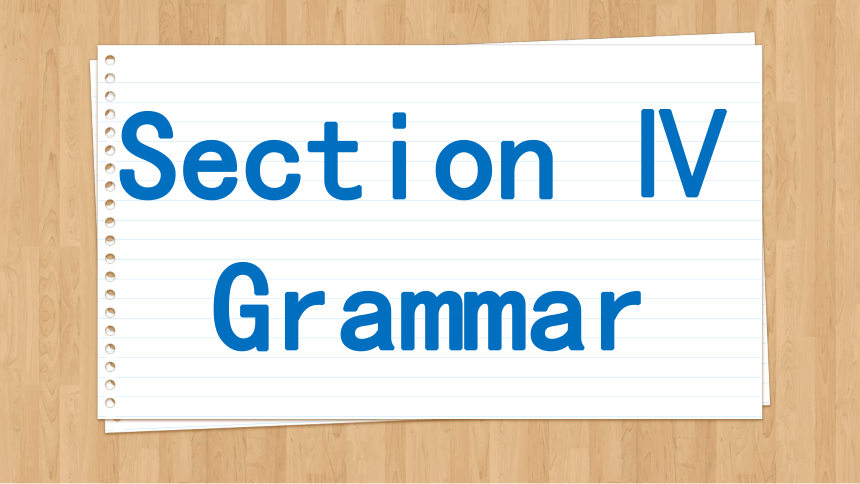

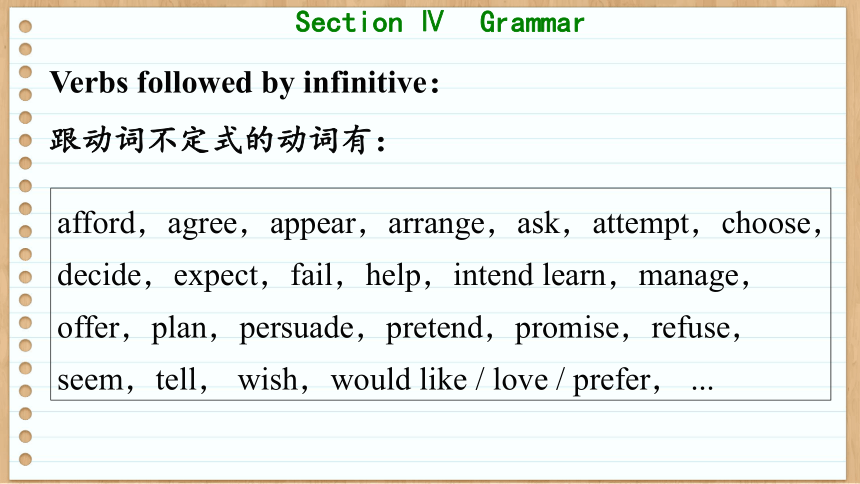
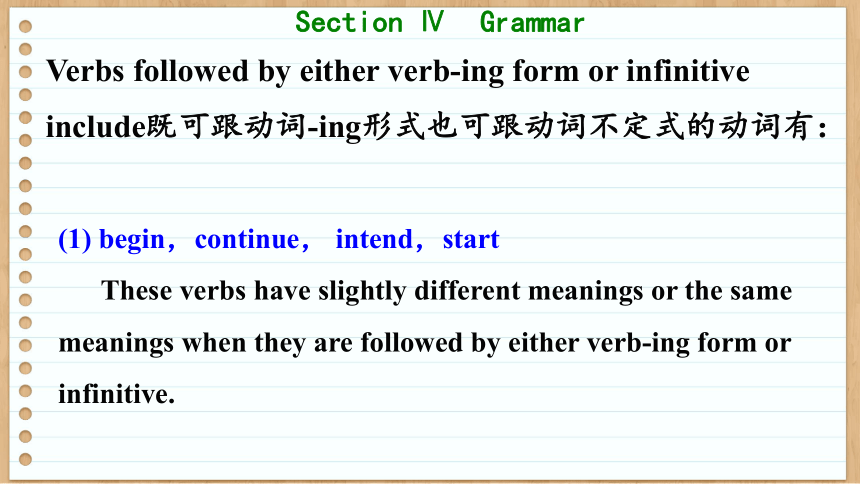
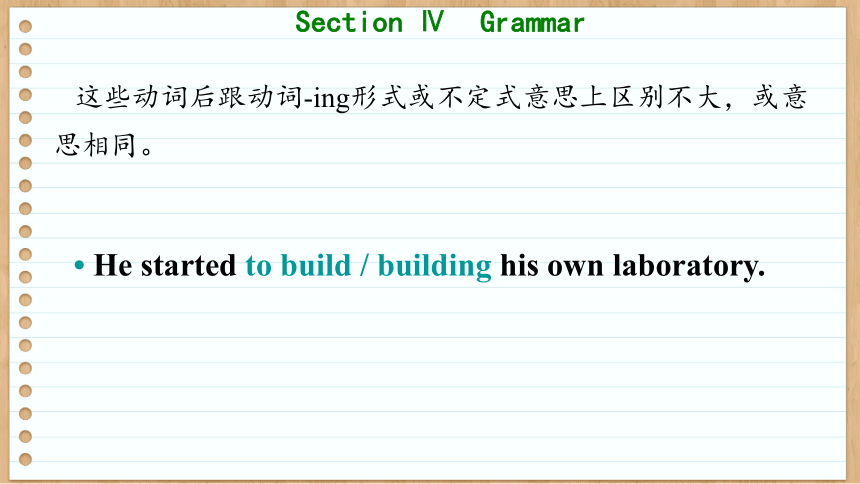


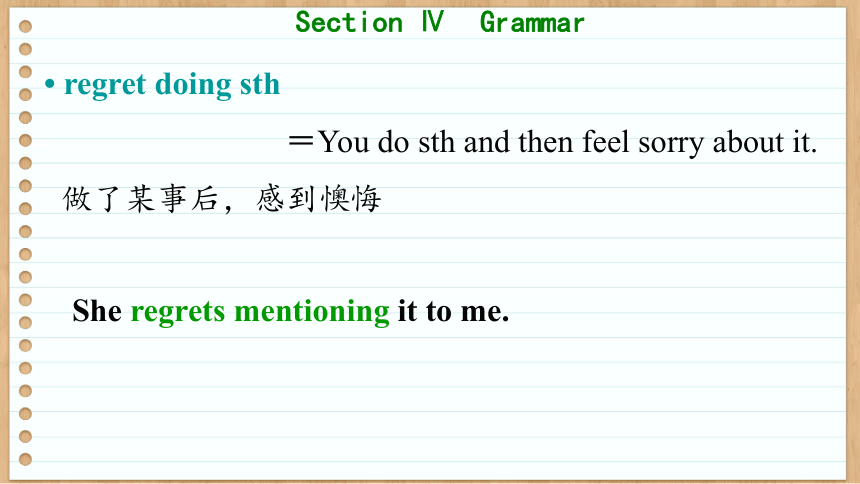
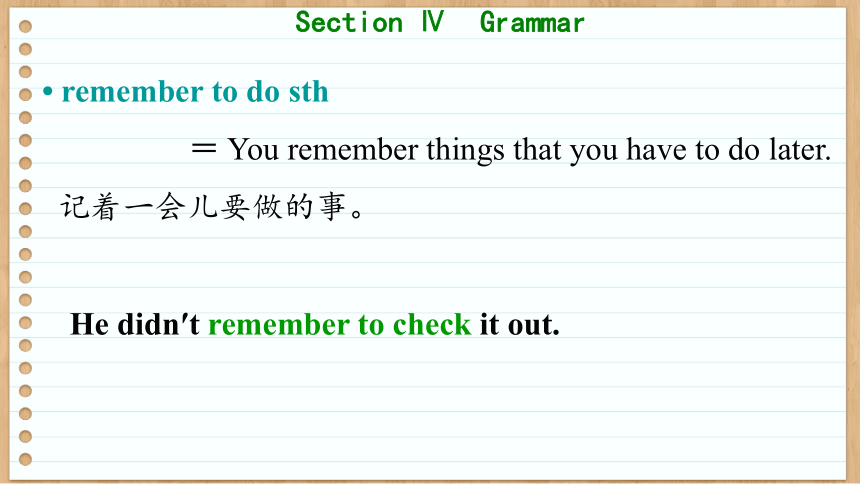
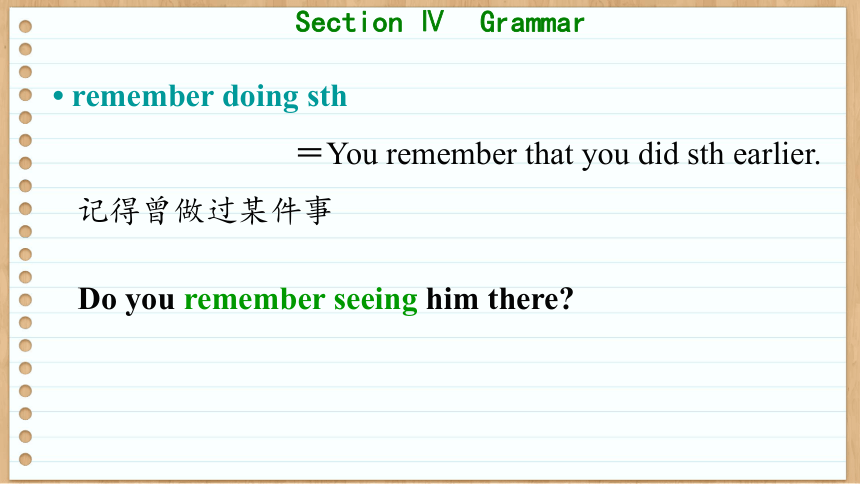
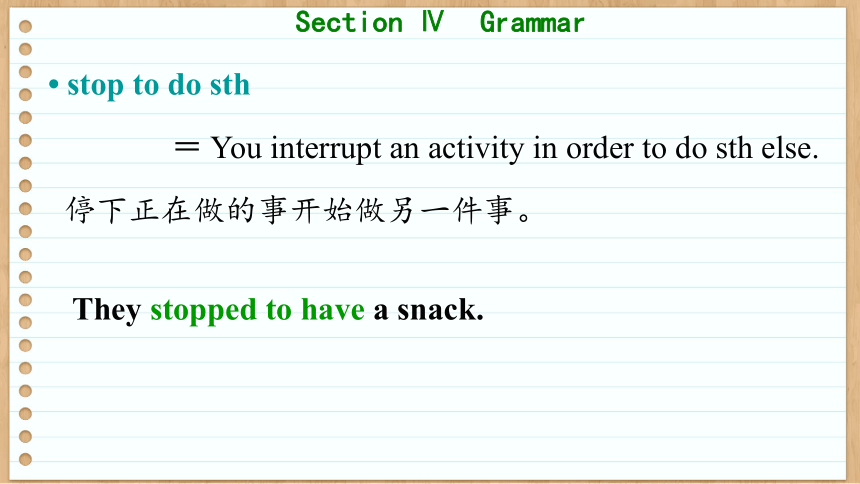
文档简介
(共71张PPT)
Unit 9 Learning
Section Ⅳ Grammar
Verbs followed by verb-ing form:
跟动词-ing形式的动词有:
admit,advise,avoid,can′t help,can′t stand,consider, delay,deny,enjoy,fancy,finish,give up,imagine,keep,mind,miss,practise,put off,risk,suggest, ...
1 Verbs Followed by Verb-ing Form or Infinitive
接动词 -ing 形式或不定式的动词
Verbs followed by infinitive:
跟动词不定式的动词有:
afford,agree,appear,arrange,ask,attempt,choose,decide,expect,fail,help,intend learn,manage,offer,plan,persuade,pretend,promise,refuse,seem,tell, wish,would like / love / prefer, ...
Verbs followed by either verb-ing form or infinitive include既可跟动词-ing形式也可跟动词不定式的动词有:
(1) begin,continue, intend,start
These verbs have slightly different meanings or the same meanings when they are followed by either verb-ing form or infinitive.
这些动词后跟动词-ing形式或不定式意思上区别不大,或意思相同。
He started to build / building his own laboratory.
(2) hate, like,love,prefer
Many liking or disliking verbs are most commonly followed by verb-ing form,but can also be followed by an infinitive.
大部分表示“喜欢”或“不喜欢”的动词常跟动词-ing形式,也可以跟动词不定式。
(3) forget,mean,regret,remember,stop,try
These verbs carry different meanings when they are followed by verb-ing form or infinitive.
这些动词后用动词-ing 形式和用不定式意思不同。
regret to do sth=You feel sorry before you do sth.
做某事前,感觉遗憾、惋惜。
I regret to say that the meeting wasn′t successful.
regret doing sth
=You do sth and then feel sorry about it.
做了某事后,感到懊悔
She regrets mentioning it to me.
remember to do sth
= You remember things that you have to do later.
记着一会儿要做的事。
He didn′t remember to check it out.
remember doing sth
=You remember that you did sth earlier.
记得曾做过某件事
Do you remember seeing him there
stop to do sth
= You interrupt an activity in order to do sth else.
停下正在做的事开始做另一件事。
They stopped to have a snack.
stop doing sth
= You are doing sth and then you interrupt this activity.
停上正在做的事。
We stopped talking because we heard a strange noise outside.
try to do sth= You make an effort to do sth.
努力、尽力做某事。
I tried to ring you but I couldn′t get through.
try doing sth
= You do sth to find out if it produces a result you want.
试着做某事,看是否可以达到预期的结果。
I′ll try baking bread tonight.
2 Subject-Verb Agreement 主谓一致
We need to change the form of predicate verbs / auxiliary verbs to make sure the subject and verb agree with each other in numbers. We pay special attention to the simple present tense and the auxiliary verbs:be,do / does and have / has. 为了确保谓语动词和助动词在人称和数上与主语保持一致,我们需要改变谓语动词或助动词的形式。特别要注意一般现在时和助动词:be,do/does和have/has。
In the simple present tense,the subject determines if we need to add -s to the predicate verb.
在一般现在时的句子中,主语决定谓语动词是否需要加s。
He knows that some people are smart.(We add -s to show the subject is singular.)
They know that some people are smart. (We do not add -s,because the subject is plural.)
In other tenses,the auxiliary verbs be,do and have ensure the subject agrees with the verb.
当句子是其他时态时,助动词be,do和have 使主语与动词在人称和数上保持一致。
We have been losing brain cells every day. (The verb have shows the subject is plural)
He has been reading the book. (The verb has shows the subject is singular.)
When the conjunction or appears in the subject,the noun closest to the predicate verb takes the agreement.
当主语中出现连词or的时候,谓语动词的数与其最靠近的名词保持一致。
The boy or his friends run every day. (Since the closest noun friends is plural,the verb agrees with the plural noun.)
His friends or the boy runs every day. (Since the closest noun the boy is singular the verb agrees with the singular noun.)
When any of these words appear in the subject, the predicate verb agrees with the subject in the same way as a singular noun:verb-ing form,each,either,neither,everyone,anyone,nobody and no one.
当句子的主语是动-ing 形式,以及 each,either,neither, everyone,anyone,nobody,no one 等词时,谓语动词采用单数形式。
Each of the children gets a book to read.
Writing your notes clearly helps you remember the things better
However,if modal verbs come before the predicate verb or the auxiliary verb,we do not change the verb; we use the bare infinitive.
但是,如果句中的谓语动词或助动词前面有情态动词,谓语动词用原形。
He swims every day. (Since there is no modal verb,we add -s to the verb to show the subject is singular)
He can swim. (The modal verb can does not allow us to add -s to the verb to show the subject is singular.)
语法感知
选择正确的答案
1. The old man planned ___________(to build/ building) a new house the next year.
2. My sister is considering _______________(changing/to change) her present job.
to build
changing
3. Unluckily,the boy failed __________(passing/to pass) the final exam.
4. He promised ______________ (to offer/offering) us some practical advice.
5. A large amount of money ___________(was/were) wasted on the project.
6. Not only the girl but also her parents _______(is/are) fond of the film.
to pass
to offer
was
are
语法探究
知识脉络
语法精讲
1. 接动词 –ing 形式的(短语)动词有:
一、接动词-ing形式或不定式的动词
admit,advise,avoid,can′t help,can′t stand,consider,delay,enjoy,fancy,finish,give up,imagine,keep,mind,miss,practise,put off,risk,suggest 等
Eg. I really can′t stand working with such a selfish person.
我确实无法忍受和这样自私的人一起共事。
These days my brother is practising speaking English.
这些天我哥哥正在练习说英语。
2. 接不定式的(短语)动词有:
afford,agree,appear,arrange,ask,attempt,choose,decide,expect,fail,help,intend,learn,manage,offer,plan,persuade,pretend,promise,refuse,seem,tell,wish,would like/love/prefer 等
Eg. Her parents couldn′t afford to send her to school at the time.
当时她的父母没有钱送她去上学。
Later,she chose to be a teacher in the countryside.
后来,她选择在乡下做了一名老师。
Don′t worry! He has promised to help us when we get into trouble.
不用担心!他已经答应在我们遇到麻烦时帮助我们。
【即学即用】
单句语法填空
①Do you mind ____________(open) all the windows now
②In the end the boy admitted _________(cheat) in the exam.
③When she grew up,she chose __________(be) a doctor.
④The man decided to delay __________(announce) the result.
⑤He managed _____________(find) an empty room for the homeless children.
opening
cheating
to be
announcing
to find
3. 既可以接动词 -ing形式也可以接不定式的动词有:
①begin,continue,intend,start
这些动词后跟动词 -ing 形式或不定式意思上差别不大,或意思相同。
He started to build/building his own laboratory.
他开始建造他自己的实验室。
②hate,like,love,prefer
大部分表示“喜欢”或“不喜欢”的动词常跟动词 -ing形式,也可以接不定式,但有时在意思上略有区别。
Eg. I hate driving along on a long journey.
我不喜欢独自一人长途开车。
He hates to lie to his mother.
他讨厌对他的妈妈撒谎。
③forget,mean,regret,remember,stop,try
这些动词后面用动词 -ing 形式和用不定式意思不同。
regret to do sth 遗憾地要去做某事
regret doing sth 做了此事之后感到后悔
Eg. I regret to say that the meeting wasn′t successful.
我很遗憾地说,这个会议没有成功。
She regrets mentioning it to me.
她后悔向我提及此事。
remember to do sth 记得要去做某事
remember doing sth 记得曾做过某事
Eg. Remember to send an email to your mother.
记得给你妈妈发一封邮件。
Do you remember seeing him there
你记得在那里见到他了吗
stop to do sth 停下正在做的事,开始做另一件事
stop doing sth 停止正在做的事情
Eg. They stopped to have a rest. 他们停下来休息。
We stopped talking because we heard a strange noise outside.
我们停止了谈话,因为我们听到外面有奇怪的声音。
try to do sth 努力、尽力做某事
try doing sth 试着做某事,看是否可以达到预期的结果
Eg. I tried to ring you but I couldn′t get through.
我尽力给你打电话,但是我打不通。
I′ll try baking bread tonight.
今晚我要尝试烤面包。
【即学即用】
翻译句子
① 很遗憾地告诉你,你被解雇了。
____________________________________________
②我记得被我父母带到公园的事情。
____________________________________________
I regret to tell you that you have been fired.
I remember being taken to the park by my parents.
③ 很抱歉,但是我的本意并不是要伤害你。
____________________________________________
④ 不要忘记在周末给你父母写信。
____________________________________________
I′m sorry,but I didn′t mean to harm you.
Don′t forget to write to your parents at weekends.
二、主谓一致
英语中主语和谓语保持一致——即谓语动词的形式必须随着主语人称和数的变化而变化——叫主谓一致。
1. 由连词and或both...and...连接的两个并列成分作主语,其谓语动词一般用复数。
Eg. The peasant and writer is making a speech in the meeting room.
那位农民作家正在会议室里发表演讲。
(一)语法结构的一致
注意 :①当and连接的两个词或词组表达的是同一个人、物或概念时,谓语动词用单数。如果这两个词都是名词,则第二个名词前不用冠词。
Eg. The peasant and writer is making a speech in the meeting room.
那位农民作家正在会议室里发表演讲。
②主语后有 with,together with,like,but,as well as,except,including,rather than,besides 等引导的词或短语时,谓语动词要和前面的主语保持一致。
Eg. The teacher together with some students is visiting the factory.
老师带着一些学生正在参观工厂。
2. 两个并列的名词前有each,every等修饰时,谓语动词一般用单数。
Eg. Each student and each teacher was given a ticket.
每个学生和老师都发了一张票。
Every man and every woman is at work.
所有人都在工作。
3. 在正式的文体中,由not only...but also...,neither...nor..., either...or...,or等连接两个并列主语时,其谓语动词与其靠近的主语保持一致。there be句式也是如此。
Eg. Not only the students but also the teacher hasn′t come.
学生们和老师都没来。
Neither the children nor the mother likes this kind of music.
孩子们和妈妈都不喜欢这种音乐。
Either you or I am to blame.
你或我该受责备。
There is a book and two pens on the desk.
书桌上有一本书和两支钢笔。
【即学即用】
单句语法填空
①The student,together with his classmates,__________ (go) to the park every Sunday.
②Either the man or his brothers ________________(invite) to the party last night.
goes
were invited
③ Not only food but also some clothes _______________ (send) to that area.
④ It is you,rather than your sister,________ (be) to blame for the accident.
have been sent
are
1. 表示时间、金钱、距离、体积、重量、面积等的复数名词作主语时,通常将其视为一个整体,谓语动词用单数。
Eg. Two miles is too far for the child.
两英里路程对这个孩子来说太远了。
(二) 意义一致原则
2. 集合名词family class crowd team government company group 等作主语时,如果强调整体,谓语动词用单数;如果强调个体,谓语动词用复数。
Eg. Our class is better than any other class at playing football in our school.
在我们学校,我们班在踢足球方面比其他任何班都好。(强调整体)
His family are waiting for him to come back from abroad.
他的家人正在等他回国。(强调个体)
3. 当 people,police,cattle 等词作主语时,谓语动词往往用复数。
Eg. The police are searching for the lost child.
警察正在寻找那个失踪的孩子。
4. 不定代词anyone,anybody,anything,everyone,everybody, everything,someone,somebody,something,no one,nobody, nothing,each,the other,either,neither,等作主语时,谓语动词用单数。
Eg. Since everyone is here,let′s begin our meeting.
既然大家都到了,我们开会吧。
5. 代词none作主语时,谓语动词用单数还是用复数,主要由说话人的意思来决定。但代表不可数名词时,谓语动词只能用单数。
Eg. None of them knows/know the answers.
他们中没有人知道答案。
None of the information about him has been received.
没收到一点关于他的消息。
6.专有名词作主语
表示国家、机构、事件、作品等名称的专有名词作主语时,谓语动词用单数。
Eg. One Thousand and One Nights tells people lots of mysterious folklore.
《一千零一夜》给人们讲了许多神秘的民间传说。
The United Nations plays an important role in the international affairs.
联合国在国际事务中起着重要作用。
7. 动词不定式、动词-ing形式或从句作主语时,谓语动词用单数。
Eg. How to solve the problem is to be discussed at the meeting.
如何解决这个问题要在会上讨论。
Whether he will help us with it doesn′t matter too much.
他是否帮我们处理它关系不大。
Reading in the sun is bad for your eyes.
在阳光下读书对你的眼睛有害。
【即学即用】
翻译句子
① 全家人正在吃饭,这时有人敲门。
_____________________________________________
_____________________________________________
②他们中没有人愿意在台上展示自己。
_____________________________________________
_____________________________________________
The family were having supper when someone knocked at the door.
None of them are willing to present themselves on the platform.
③ 什么时候举行会议还没决定。
_____________________________________________
_____________________________________________
④考试前听音乐能使你放松。
_____________________________________________
_____________________________________________
When to hold a meeting hasn′t been decided yet.
Listening to music before the exam can make you relaxed.
1. 当百分数或分数修饰的名词作主语时,谓语动词用单数还是用复数由名词来决定。
(三) 需要注意的几种情况
Eg. About three fourths of the surface of the earth is water.
地球表面大约四分之三是水。
About 50 percent of the students in our school are girls.
我们学校大约百分之五十的学生是女生。
2. 由“kind(type,sort,species,portion,series) of”等修饰的主语,其谓语形式取决于这些词的单复数而不是它们后面所跟的名词。
Eg. This new type of buses is now on show.
(Buses of this new kind are now on show.)
现在正展出一种新型的公共汽车。
Eg. All kinds of difficulties have to be overcome.
必须克服各种各样的困难。
A series of debates between the lecturers was scheduled for the next weekend.
讲师之间一系列的辩论安排在下周末举行。
3. a number of(许多),a variety of(各种各样的)和a group of(一群,一组)修饰名词作主语时,谓语动词要用复数形式。但是the number of(……的数目)和the variety of(……的种类)修饰名词作主语时,谓语动词要用单数形式。试比较:
Eg. A number of students are from the south.
不少学生来自南方。
Eg. The number of students from the south is large.
来自南方的学生数量很多。
A variety of toys are on sale in that shop.
那个商店出售各种各样的玩具。
The variety of goods on sale in that shop is surprising.
那个商店出售的货物品种多得惊人。
【即学即用】
一、单句语法填空
① Two thirds of the money _________________(spend) on this project.
② In the old days,this kind of knives ____________(use) to cut the hard things.
③ A series of accidents ___________________(happen) in this street so far.
has been spent
was used
have happened
二、翻译句子
④ 参加这个活动的人的数量是500。
_______________________________________________
⑤ 四分之三的村民现在生活得很幸福。
_______________________________________________
The number of the people taking part in the activity is 500.
Three quarters of the villagers are leading a happy life now.
本课结束
This lesson is over
THANKS!
Unit 9 Learning
Section Ⅳ Grammar
Verbs followed by verb-ing form:
跟动词-ing形式的动词有:
admit,advise,avoid,can′t help,can′t stand,consider, delay,deny,enjoy,fancy,finish,give up,imagine,keep,mind,miss,practise,put off,risk,suggest, ...
1 Verbs Followed by Verb-ing Form or Infinitive
接动词 -ing 形式或不定式的动词
Verbs followed by infinitive:
跟动词不定式的动词有:
afford,agree,appear,arrange,ask,attempt,choose,decide,expect,fail,help,intend learn,manage,offer,plan,persuade,pretend,promise,refuse,seem,tell, wish,would like / love / prefer, ...
Verbs followed by either verb-ing form or infinitive include既可跟动词-ing形式也可跟动词不定式的动词有:
(1) begin,continue, intend,start
These verbs have slightly different meanings or the same meanings when they are followed by either verb-ing form or infinitive.
这些动词后跟动词-ing形式或不定式意思上区别不大,或意思相同。
He started to build / building his own laboratory.
(2) hate, like,love,prefer
Many liking or disliking verbs are most commonly followed by verb-ing form,but can also be followed by an infinitive.
大部分表示“喜欢”或“不喜欢”的动词常跟动词-ing形式,也可以跟动词不定式。
(3) forget,mean,regret,remember,stop,try
These verbs carry different meanings when they are followed by verb-ing form or infinitive.
这些动词后用动词-ing 形式和用不定式意思不同。
regret to do sth=You feel sorry before you do sth.
做某事前,感觉遗憾、惋惜。
I regret to say that the meeting wasn′t successful.
regret doing sth
=You do sth and then feel sorry about it.
做了某事后,感到懊悔
She regrets mentioning it to me.
remember to do sth
= You remember things that you have to do later.
记着一会儿要做的事。
He didn′t remember to check it out.
remember doing sth
=You remember that you did sth earlier.
记得曾做过某件事
Do you remember seeing him there
stop to do sth
= You interrupt an activity in order to do sth else.
停下正在做的事开始做另一件事。
They stopped to have a snack.
stop doing sth
= You are doing sth and then you interrupt this activity.
停上正在做的事。
We stopped talking because we heard a strange noise outside.
try to do sth= You make an effort to do sth.
努力、尽力做某事。
I tried to ring you but I couldn′t get through.
try doing sth
= You do sth to find out if it produces a result you want.
试着做某事,看是否可以达到预期的结果。
I′ll try baking bread tonight.
2 Subject-Verb Agreement 主谓一致
We need to change the form of predicate verbs / auxiliary verbs to make sure the subject and verb agree with each other in numbers. We pay special attention to the simple present tense and the auxiliary verbs:be,do / does and have / has. 为了确保谓语动词和助动词在人称和数上与主语保持一致,我们需要改变谓语动词或助动词的形式。特别要注意一般现在时和助动词:be,do/does和have/has。
In the simple present tense,the subject determines if we need to add -s to the predicate verb.
在一般现在时的句子中,主语决定谓语动词是否需要加s。
He knows that some people are smart.(We add -s to show the subject is singular.)
They know that some people are smart. (We do not add -s,because the subject is plural.)
In other tenses,the auxiliary verbs be,do and have ensure the subject agrees with the verb.
当句子是其他时态时,助动词be,do和have 使主语与动词在人称和数上保持一致。
We have been losing brain cells every day. (The verb have shows the subject is plural)
He has been reading the book. (The verb has shows the subject is singular.)
When the conjunction or appears in the subject,the noun closest to the predicate verb takes the agreement.
当主语中出现连词or的时候,谓语动词的数与其最靠近的名词保持一致。
The boy or his friends run every day. (Since the closest noun friends is plural,the verb agrees with the plural noun.)
His friends or the boy runs every day. (Since the closest noun the boy is singular the verb agrees with the singular noun.)
When any of these words appear in the subject, the predicate verb agrees with the subject in the same way as a singular noun:verb-ing form,each,either,neither,everyone,anyone,nobody and no one.
当句子的主语是动-ing 形式,以及 each,either,neither, everyone,anyone,nobody,no one 等词时,谓语动词采用单数形式。
Each of the children gets a book to read.
Writing your notes clearly helps you remember the things better
However,if modal verbs come before the predicate verb or the auxiliary verb,we do not change the verb; we use the bare infinitive.
但是,如果句中的谓语动词或助动词前面有情态动词,谓语动词用原形。
He swims every day. (Since there is no modal verb,we add -s to the verb to show the subject is singular)
He can swim. (The modal verb can does not allow us to add -s to the verb to show the subject is singular.)
语法感知
选择正确的答案
1. The old man planned ___________(to build/ building) a new house the next year.
2. My sister is considering _______________(changing/to change) her present job.
to build
changing
3. Unluckily,the boy failed __________(passing/to pass) the final exam.
4. He promised ______________ (to offer/offering) us some practical advice.
5. A large amount of money ___________(was/were) wasted on the project.
6. Not only the girl but also her parents _______(is/are) fond of the film.
to pass
to offer
was
are
语法探究
知识脉络
语法精讲
1. 接动词 –ing 形式的(短语)动词有:
一、接动词-ing形式或不定式的动词
admit,advise,avoid,can′t help,can′t stand,consider,delay,enjoy,fancy,finish,give up,imagine,keep,mind,miss,practise,put off,risk,suggest 等
Eg. I really can′t stand working with such a selfish person.
我确实无法忍受和这样自私的人一起共事。
These days my brother is practising speaking English.
这些天我哥哥正在练习说英语。
2. 接不定式的(短语)动词有:
afford,agree,appear,arrange,ask,attempt,choose,decide,expect,fail,help,intend,learn,manage,offer,plan,persuade,pretend,promise,refuse,seem,tell,wish,would like/love/prefer 等
Eg. Her parents couldn′t afford to send her to school at the time.
当时她的父母没有钱送她去上学。
Later,she chose to be a teacher in the countryside.
后来,她选择在乡下做了一名老师。
Don′t worry! He has promised to help us when we get into trouble.
不用担心!他已经答应在我们遇到麻烦时帮助我们。
【即学即用】
单句语法填空
①Do you mind ____________(open) all the windows now
②In the end the boy admitted _________(cheat) in the exam.
③When she grew up,she chose __________(be) a doctor.
④The man decided to delay __________(announce) the result.
⑤He managed _____________(find) an empty room for the homeless children.
opening
cheating
to be
announcing
to find
3. 既可以接动词 -ing形式也可以接不定式的动词有:
①begin,continue,intend,start
这些动词后跟动词 -ing 形式或不定式意思上差别不大,或意思相同。
He started to build/building his own laboratory.
他开始建造他自己的实验室。
②hate,like,love,prefer
大部分表示“喜欢”或“不喜欢”的动词常跟动词 -ing形式,也可以接不定式,但有时在意思上略有区别。
Eg. I hate driving along on a long journey.
我不喜欢独自一人长途开车。
He hates to lie to his mother.
他讨厌对他的妈妈撒谎。
③forget,mean,regret,remember,stop,try
这些动词后面用动词 -ing 形式和用不定式意思不同。
regret to do sth 遗憾地要去做某事
regret doing sth 做了此事之后感到后悔
Eg. I regret to say that the meeting wasn′t successful.
我很遗憾地说,这个会议没有成功。
She regrets mentioning it to me.
她后悔向我提及此事。
remember to do sth 记得要去做某事
remember doing sth 记得曾做过某事
Eg. Remember to send an email to your mother.
记得给你妈妈发一封邮件。
Do you remember seeing him there
你记得在那里见到他了吗
stop to do sth 停下正在做的事,开始做另一件事
stop doing sth 停止正在做的事情
Eg. They stopped to have a rest. 他们停下来休息。
We stopped talking because we heard a strange noise outside.
我们停止了谈话,因为我们听到外面有奇怪的声音。
try to do sth 努力、尽力做某事
try doing sth 试着做某事,看是否可以达到预期的结果
Eg. I tried to ring you but I couldn′t get through.
我尽力给你打电话,但是我打不通。
I′ll try baking bread tonight.
今晚我要尝试烤面包。
【即学即用】
翻译句子
① 很遗憾地告诉你,你被解雇了。
____________________________________________
②我记得被我父母带到公园的事情。
____________________________________________
I regret to tell you that you have been fired.
I remember being taken to the park by my parents.
③ 很抱歉,但是我的本意并不是要伤害你。
____________________________________________
④ 不要忘记在周末给你父母写信。
____________________________________________
I′m sorry,but I didn′t mean to harm you.
Don′t forget to write to your parents at weekends.
二、主谓一致
英语中主语和谓语保持一致——即谓语动词的形式必须随着主语人称和数的变化而变化——叫主谓一致。
1. 由连词and或both...and...连接的两个并列成分作主语,其谓语动词一般用复数。
Eg. The peasant and writer is making a speech in the meeting room.
那位农民作家正在会议室里发表演讲。
(一)语法结构的一致
注意 :①当and连接的两个词或词组表达的是同一个人、物或概念时,谓语动词用单数。如果这两个词都是名词,则第二个名词前不用冠词。
Eg. The peasant and writer is making a speech in the meeting room.
那位农民作家正在会议室里发表演讲。
②主语后有 with,together with,like,but,as well as,except,including,rather than,besides 等引导的词或短语时,谓语动词要和前面的主语保持一致。
Eg. The teacher together with some students is visiting the factory.
老师带着一些学生正在参观工厂。
2. 两个并列的名词前有each,every等修饰时,谓语动词一般用单数。
Eg. Each student and each teacher was given a ticket.
每个学生和老师都发了一张票。
Every man and every woman is at work.
所有人都在工作。
3. 在正式的文体中,由not only...but also...,neither...nor..., either...or...,or等连接两个并列主语时,其谓语动词与其靠近的主语保持一致。there be句式也是如此。
Eg. Not only the students but also the teacher hasn′t come.
学生们和老师都没来。
Neither the children nor the mother likes this kind of music.
孩子们和妈妈都不喜欢这种音乐。
Either you or I am to blame.
你或我该受责备。
There is a book and two pens on the desk.
书桌上有一本书和两支钢笔。
【即学即用】
单句语法填空
①The student,together with his classmates,__________ (go) to the park every Sunday.
②Either the man or his brothers ________________(invite) to the party last night.
goes
were invited
③ Not only food but also some clothes _______________ (send) to that area.
④ It is you,rather than your sister,________ (be) to blame for the accident.
have been sent
are
1. 表示时间、金钱、距离、体积、重量、面积等的复数名词作主语时,通常将其视为一个整体,谓语动词用单数。
Eg. Two miles is too far for the child.
两英里路程对这个孩子来说太远了。
(二) 意义一致原则
2. 集合名词family class crowd team government company group 等作主语时,如果强调整体,谓语动词用单数;如果强调个体,谓语动词用复数。
Eg. Our class is better than any other class at playing football in our school.
在我们学校,我们班在踢足球方面比其他任何班都好。(强调整体)
His family are waiting for him to come back from abroad.
他的家人正在等他回国。(强调个体)
3. 当 people,police,cattle 等词作主语时,谓语动词往往用复数。
Eg. The police are searching for the lost child.
警察正在寻找那个失踪的孩子。
4. 不定代词anyone,anybody,anything,everyone,everybody, everything,someone,somebody,something,no one,nobody, nothing,each,the other,either,neither,等作主语时,谓语动词用单数。
Eg. Since everyone is here,let′s begin our meeting.
既然大家都到了,我们开会吧。
5. 代词none作主语时,谓语动词用单数还是用复数,主要由说话人的意思来决定。但代表不可数名词时,谓语动词只能用单数。
Eg. None of them knows/know the answers.
他们中没有人知道答案。
None of the information about him has been received.
没收到一点关于他的消息。
6.专有名词作主语
表示国家、机构、事件、作品等名称的专有名词作主语时,谓语动词用单数。
Eg. One Thousand and One Nights tells people lots of mysterious folklore.
《一千零一夜》给人们讲了许多神秘的民间传说。
The United Nations plays an important role in the international affairs.
联合国在国际事务中起着重要作用。
7. 动词不定式、动词-ing形式或从句作主语时,谓语动词用单数。
Eg. How to solve the problem is to be discussed at the meeting.
如何解决这个问题要在会上讨论。
Whether he will help us with it doesn′t matter too much.
他是否帮我们处理它关系不大。
Reading in the sun is bad for your eyes.
在阳光下读书对你的眼睛有害。
【即学即用】
翻译句子
① 全家人正在吃饭,这时有人敲门。
_____________________________________________
_____________________________________________
②他们中没有人愿意在台上展示自己。
_____________________________________________
_____________________________________________
The family were having supper when someone knocked at the door.
None of them are willing to present themselves on the platform.
③ 什么时候举行会议还没决定。
_____________________________________________
_____________________________________________
④考试前听音乐能使你放松。
_____________________________________________
_____________________________________________
When to hold a meeting hasn′t been decided yet.
Listening to music before the exam can make you relaxed.
1. 当百分数或分数修饰的名词作主语时,谓语动词用单数还是用复数由名词来决定。
(三) 需要注意的几种情况
Eg. About three fourths of the surface of the earth is water.
地球表面大约四分之三是水。
About 50 percent of the students in our school are girls.
我们学校大约百分之五十的学生是女生。
2. 由“kind(type,sort,species,portion,series) of”等修饰的主语,其谓语形式取决于这些词的单复数而不是它们后面所跟的名词。
Eg. This new type of buses is now on show.
(Buses of this new kind are now on show.)
现在正展出一种新型的公共汽车。
Eg. All kinds of difficulties have to be overcome.
必须克服各种各样的困难。
A series of debates between the lecturers was scheduled for the next weekend.
讲师之间一系列的辩论安排在下周末举行。
3. a number of(许多),a variety of(各种各样的)和a group of(一群,一组)修饰名词作主语时,谓语动词要用复数形式。但是the number of(……的数目)和the variety of(……的种类)修饰名词作主语时,谓语动词要用单数形式。试比较:
Eg. A number of students are from the south.
不少学生来自南方。
Eg. The number of students from the south is large.
来自南方的学生数量很多。
A variety of toys are on sale in that shop.
那个商店出售各种各样的玩具。
The variety of goods on sale in that shop is surprising.
那个商店出售的货物品种多得惊人。
【即学即用】
一、单句语法填空
① Two thirds of the money _________________(spend) on this project.
② In the old days,this kind of knives ____________(use) to cut the hard things.
③ A series of accidents ___________________(happen) in this street so far.
has been spent
was used
have happened
二、翻译句子
④ 参加这个活动的人的数量是500。
_______________________________________________
⑤ 四分之三的村民现在生活得很幸福。
_______________________________________________
The number of the people taking part in the activity is 500.
Three quarters of the villagers are leading a happy life now.
本课结束
This lesson is over
THANKS!
同课章节目录
- Unit 7 Art
- Lesson 1 Masterpieces
- Lesson 2 Beijing Opera
- Lesson 3 A Musical Genius
- Unit 8 Green living
- Lesson 1 Roots and Shoots
- Lesson 2 Greening the Desert
- Lesson 3 "White Bikes" on the Road
- Unit 9 Learning
- Lesson 1 Active Learning
- Lesson 2 Language Learning Tips
- Lesson 3 The Secrets of Your Memory
